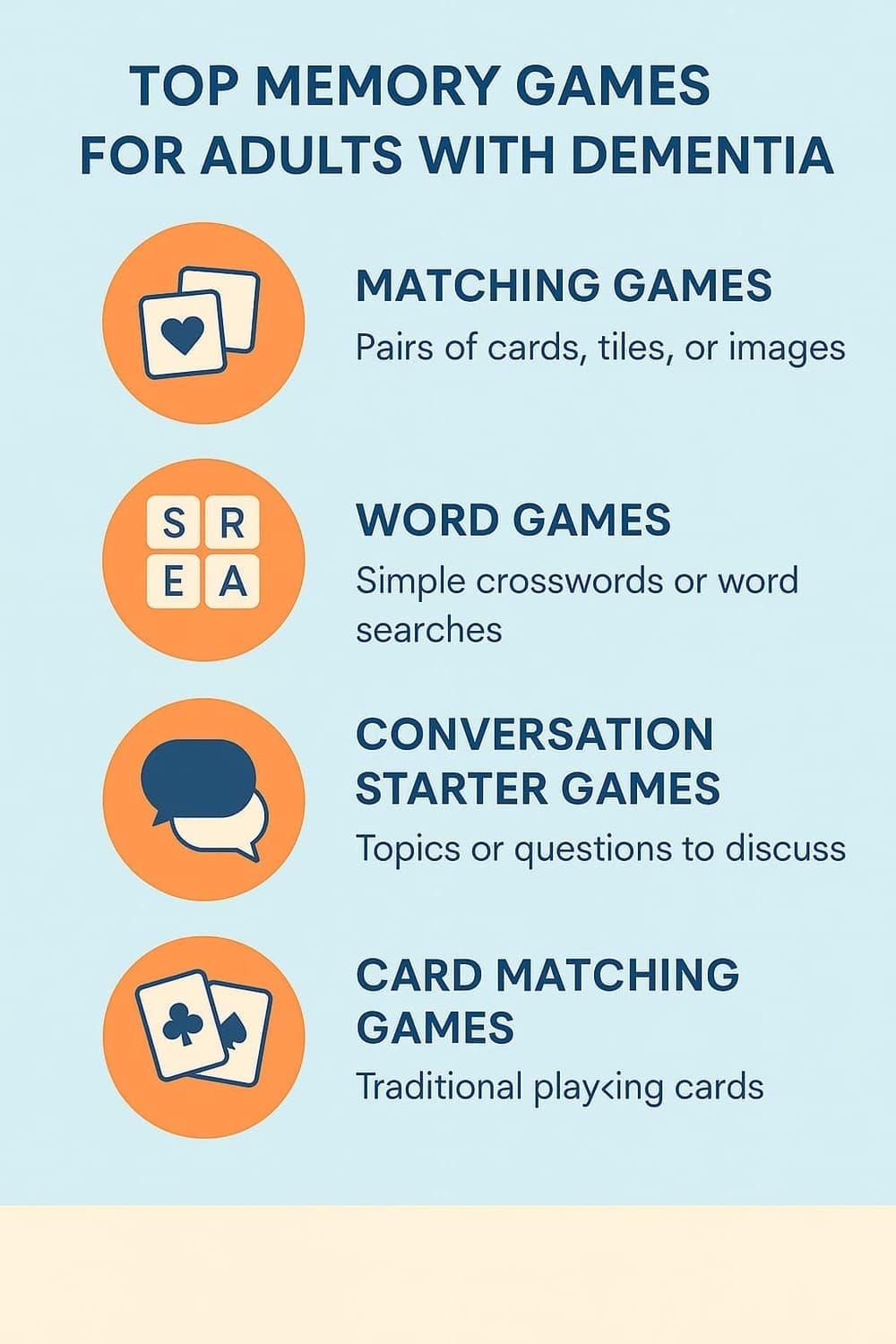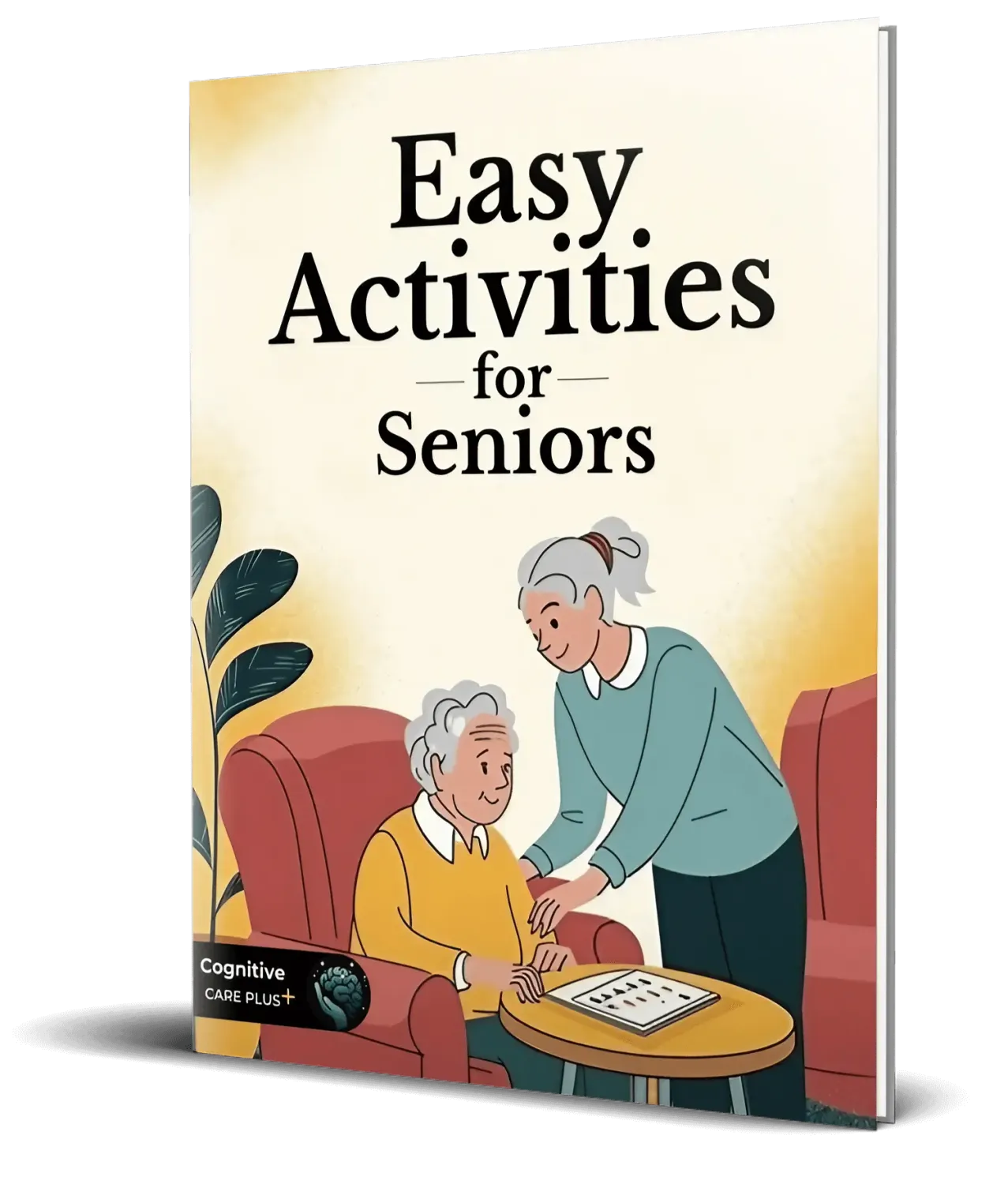Top Memory Games for Adults with Dementia: Boost Engagement
Why Memory Games Matter for People with Dementia
Have you ever seen your loved one’s eyes light up when they recall a familiar face or hum along to an old song? That spark—that precious moment—is what memory games are designed to protect and nurture.
When you're caring for someone with dementia, finding gentle ways to connect and stimulate the mind becomes essential. Memory games aren’t just fun distractions—they can become small windows of clarity, connection, and joy.
Let’s explore the best memory games for adults with dementia, and how they can boost engagement and bring meaningful moments into your daily care routine.
🎧 Prefer to listen instead? Tap below to play our podcast episode and explore how memory games can improve attention, boost connection, and bring joy to everyday moments—especially in dementia care.
In just a few minutes, you'll hear practical tips to help you turn play into a meaningful part of your loved one’s routine.
✨ Enjoyed the episode?
Subscribe to the Cognitive Care Plus Podcast for practical guides, expert insights, and compassionate support to help you care for your loved one with dementia.
🎯 What Makes a Good Memory Game for Seniors with Dementia?
Not all memory games are created equal—especially when dementia is involved. The ideal game should be:
Easy to understand, with minimal rules
Visually or tactilely engaging (images, textures, or sounds)
Centered on positive reinforcement
Adapted to the person’s stage of dementia
Emotionally safe—not overwhelming or frustrating
These games aim to stimulate brain areas responsible for attention, recall, language, and social interaction, while promoting comfort and confidence.
Several studies suggest that memory games can help maintain mental agility, especially in the early to middle stages of dementia. Games that involve matching, pattern recognition, or light strategy can stimulate attention and recall in meaningful ways. If you're looking for professional insights and examples of effective games, this Healthline article offers a helpful overview backed by cognitive experts.
🎥 Do Brain Games Really Help?
If you're wondering whether memory games truly boost brain health, this short video summarizes what science says about their role in dementia care. It explores the real cognitive benefits, common myths, and how to include brain games as part of a healthy routine.
Best Memory Games for Adults with Dementia

Here’s a curated list of memory games that support cognitive function while creating opportunities for connection and joy.
1. Picture Matching Game for Adults
A classic that works wonders. Matching games use large, high-contrast cards with images such as animals, foods, or places. They strengthen:
Visual memory
Attention span
Recognition and pattern matching
👉 Choose matching games designed for adults with dementia: larger cards, simple images, and sturdy materials.
🧠 Neuro tip: Matching games activate procedural memory, which tends to remain stronger in earlier dementia stages.
2. Conversation Starter Games
Sometimes, one thoughtful question can unlock a beautiful memory.
Conversation starter games offer gentle prompts like:
💬 “What was your favorite meal as a child?”
💬 “Describe your first car.”
These games tap into long-term and emotional memory, encouraging storytelling, laughter, and bonding.
Ideal for:
Early and middle stages
One-on-one or group settings
Mealtime or quiet evenings
🎤 Try this: Keep a small deck of cards on the table and draw one each day to spark connection.
3. Themed Card Matching Games
Bring a personal touch with card matching games based on familiar themes like gardening, food, or travel.
🧩 Themes to consider:
Nature (flowers, trees, animals)
Everyday items (kitchen tools, clothing)
Hobbies (fishing, baking, crafts)
These themes often trigger positive memories and foster a sense of identity.
4. Games with Music or Audio Cues
In the middle stages, games that involve music, rhythms, or sound recognition become especially powerful.
🎵 Examples:
“Name That Tune” style games
Sound matching (e.g., matching birdsongs or animal noises)
Music activates deep emotional and memory centers in the brain, often outlasting verbal or short-term recall.
🧠 Care tip: Use songs from their youth or cultural background for stronger emotional resonance.
5. Story Sequencing Cards
These involve placing image cards in the correct order—like brushing teeth or making tea.
✔️ Benefits:
Reinforces routines
Stimulates executive functioning
Encourages attention and logical thinking
🧠 Neuro insight: Sequencing activities promote cognitive flexibility, which helps maintain problem-solving and daily task engagement in earlier stages.
👉 Looking for high-quality memory games recommended for dementia care?
Check out our curated collection of memory games for adults designed to support engagement and joy at every stage.
💡 Tips for Choosing the Right Memory Game
Choosing the right game isn’t about perfection—it’s about connection.
🔷Match the Game to Their Stage
Choosing the right game starts with understanding your loved one’s current stage. If you're unsure about what stage they’re in, our Dementia Stages Chart can help you identify key signs and choose the most suitable activities.
Early stage: Word games, picture matching, storytelling, puzzles
Middle stage: Simplified card games, sensory games, music-based games
Late stage: Focus on sensory comfort, not memory challenges
❗ In late-stage dementia, traditional memory games may no longer be helpful. Prioritize soothing sensory activities over cognitive stimulation.
🔷Use Familiar Themes
Games that reflect your loved one’s personal history or interests are more likely to spark recognition and joy.
🔷Keep It Short and Gentle
10–15 minutes is often ideal. The goal isn’t to “win”—it’s to connect, engage, and end on a positive note.
🌟 Why Memory Games Are More Than Just Play
It’s easy to see memory games as something small—but for someone with dementia, they can mean the world.
Each recalled face, word, or melody is a spark of identity. A moment of “still being here.” A bridge between now and yesterday.
As caregivers, these moments remind us that love and connection don’t disappear with memory—they just take new shapes.
FAQ
Picture matching games, themed card sets, conversation starter decks, and music-based games are all great options. Choose games based on the person’s interests and stage of dementia.
Yes. They help stimulate the brain, support neuroplasticity, encourage emotional expression, and offer positive social interaction. They're a gentle way to engage without pressure.
Memory games are most useful in the early and middle stages. In early stages, they help maintain recall, focus, and social skills. In middle stages, simpler games with strong visual or audio cues still offer benefits. In late-stage dementia, it’s better to focus on sensory comfort rather than memory games.
Short sessions of 10–15 minutes, a few times a week, are ideal. Consistency matters more than duration. Pay attention to your loved one’s mood and stop when they seem tired or frustrated.
Final Thoughts: Connection Through Play
You don’t need fancy apps or long instructions to create moments of meaning. A simple conversation starter, a card with a flower, or a melody from their youth can open hearts and calm minds.
With the right memory games, you’re not just helping someone “remember”—
You’re helping them feel seen, heard, and loved.
🩵 Want more free tools to make caregiving smoother? Join our list and get practical resources delivered to your inbox.
Share this article:
If this article helped you, share it with other caregivers who need encouragement.
👉 Looking for more engaging ideas for seniors? Explore all our categories to find activities, sensory tools, and brain-boosting resources for every stage of dementia care.
💬 We’d love to hear from you!
Have You Tried Memory Games with Your Loved One?
What worked best for them? Were there any surprises—good or bad?
We’d love to hear your experience in the comments below. Your story might help another caregiver feel more supported and understood.

Trending
Simple tools that make caregiving...
Turning simple play into a brain-boosting activity...
Here’s what to look for when choosing...

About me

Hi there 👋 My name is George Cassou, I'm a psychologist and the creator of this blog. Inspired by my journey caring for my mom with Alzheimer's, I share activities and tips to bring joy and connection.

Affiliate Disclosure:
This website contains affiliate links. If you click on these links and make a purchase, we may earn a small commission at no additional cost to you. These commissions help us keep this site running and allow us to continue creating helpful content to support caregivers and families.


